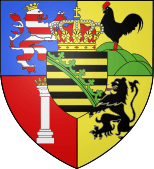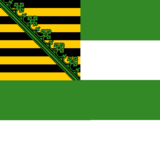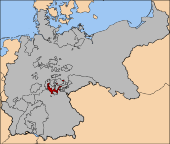List of German monarchs in 1918
| Prussian Empire | |
|---|---|
|
Royal Standard: King of Prussia (1871–1918) | |
| Preceded by | Kingdom of Prussia |
| Followed by | Abolished 1918 |
The term German Empire (Deutsches Kaiserreich) commonly refers to Germany, from its foundation as a unified nation-state on January 18, 1871, until the abdication of its last Kaiser, Wilhelm II, on November 9, 1918. Germans, when referring to the Reich in this period under the Kaisers, 1871 to 1918, typically use the term Kaiserreich. [1]
Federal prince (Bundesfürst) was the generic term for the royal heads of state (monarchs) of the various states making up the German Empire. The empire was a federal state, with its constituent states remaining sovereign states. In total, there were 22 federal princes of the German Empire and additionally three republican heads of state and the steward of the imperial territory ruled by Alsace-Lorraine. The states became part of the Kaiserreich by an 1871 treaty. The Kaiser as head of the empire was granted the title German Emperor (the style "Emperor of Germany" being deliberately avoided), and was simultaneously a federal prince as King of Prussia, the sovereign of its largest federal state. Of the princely heads of state, 4 held the title King (König) (the Kings of Prussia, Bavaria, Saxony, and Württemberg), 6 held the title Grand Duke (Großherzog), 5 held the title Duke (Herzog), and 7 held the title Prince (i.e. Sovereign Prince, Fürst).
Following the abdication of Wilhelm II on November 9, 1918 and German Revolution of 1918–19, the German nobility as a legally defined class was abolished on August 11, 1919 with the promulgation of the Weimar Constitution, under which all Germans were made equal before the law, and the legal rights and privileges, and all following German Houses, titles, insignia and ranks of nobility were abolished.
Emperor of Germany (1918)
| Emperor | Styles | Empress | Symbols | German Empire 1871 – 1918 |
|---|---|---|---|---|
 1859 – 1941 |
His Imperial and Royal Majesty The German Emperor, King of Prussia Wilhelm II Her Imperial and Royal Majesty The German Empress, Queen of Prussia Augusta Victoria |
 1858 – 1921 |
House of Hohenzollern 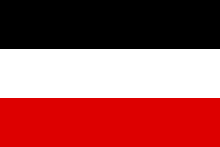 1871 – 1918 |
Kingdoms Prussia. Bavaria. Saxony. Württemberg. Grand Duchies Baden. Hesse. Mecklenburg-Schwerin. Mecklenburg-Strelitz. Oldenburg. Saxe-Weimar-Eisenach. Duchies Anhalt. Brunswick. Saxe-Altenburg. Saxe-Coburg and Gotha. Saxe-Meiningen. Principalities Lippe. Reuss, junior line. Reuss, senior line. Schaumburg-Lippe. Schwarzburg-Rudolstadt. Schwarzburg-Sondershausen. Waldeck-Pyrmont. Free Hanseatic cities Bremen. Hamburg. Lübeck. Imperial territory (Reichsland) Alsace-Lorraine. |
Statement of Abdication (1918)
I herewith renounce for all time claims to the throne of Prussia and to the German Imperial throne connected therewith. At the same time I release all officials of the German Empire and of Prussia, as well as all officers, non-commissioned officers and men of the navy and of the Prussian army, as well as the troops of the federated states of Germany, from the oath of fidelity which they tendered to me as their Emperor, King and Commander-in-Chief. I expect of them that until the re-establishment of order in the German Empire they shall render assistance to those in actual power in Germany, in protecting the German people from the threatening dangers of anarchy, famine, and foreign rule. Proclaimed under our own hand and with the imperial seal attached. Amerongen, 28 November, 1918. Signed WILLIAM. [2]
Kings and Kingdoms (1918)
Grand Dukes and Grand Duchies (1918)
Dukes and Duchies (1918)
Princes and Principalities (1918)
| Ruler | Title | Arms – Flag | House – State | Location | Spouse – Children | ||||||||||||||
|---|---|---|---|---|---|---|---|---|---|---|---|---|---|---|---|---|---|---|---|
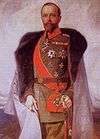 |
Prince Leopold IV 1871 – 1949 |
 |
House of Lippe 1123 – 1918 Principality of Lippe 1123 – 1918 |
 |
Spouse: (1) Princess Bertha of Hesse-Philippsthal-Barchfeld (2) Princess Anna of Ysenburg and Büdingen | ||||||||||||||
|
Ancestors of Leopold IV
| |||||||||||||||||||
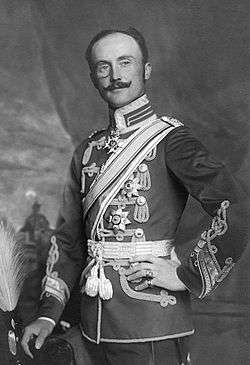 |
Prince Adolph II 1883 – 1936 |
 |
House of Lippe 1123 – 1918 Principality of Schaumburg-Lippe 1643 – 1918 |
_Schaumburg-Lippe.svg.png) |
Spouse: (1) Ellen Bischoff-Korthaus (1894–1936) | ||||||||||||||
|
Ancestors of Adolf II
| |||||||||||||||||||
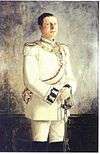 |
Prince Victor Gunther 1852 – 1925 |
  |
House of Schwarzburg 11?? – 1918 Principality of Schwarzburg-Rudolstadt 1599 – 1919 Principality of Schwarzburg-Sondershausen (1909–1920) |
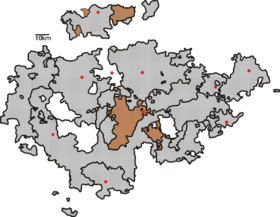 |
Spouse (1) Princess Anna Louise of Schönburg-Waldenburg | ||||||||||||||
|
Ancestors of Günther Victor
| |||||||||||||||||||
 |
Prince Friedrich 1865 – 1946 |
 .svg.png) |
House of Waldeck and Pyrmont 1815 – 1918 Principality of Waldeck-Pyrmont 1180 – 1918 |
_Waldeck.svg.png) |
Spouse: (1) Princess Bathildis of Schaumburg-Lippe Children: | ||||||||||||||
|
Ancestors of Friedrich I
| |||||||||||||||||||
 |
Prince Heinrich XXIV 1878 – 1927 |
  |
House of Reuss (Elder Line) 1778 – 1918 Principality of Reuss-Greiz 1778 – 1918 |
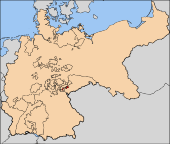 |
|||||||||||||||
|
Ancestors of Heinrich XXIV
| |||||||||||||||||||
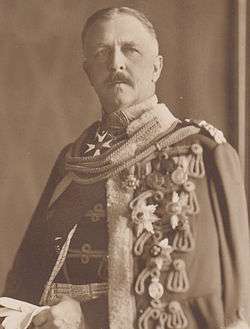 |
Prince Heinrich XXVII 1858 – 1928 |
.png)  |
House of Reuss (Younger Line) 1913 – 1918 Principality of Reuss-Gera 1806 – 1918 |
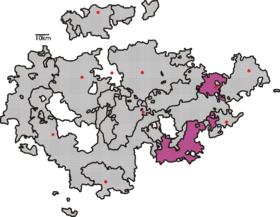 |
Spouse: (1) Princess Elise of Hohenlohe-Langenburg Children: | ||||||||||||||
|
Ancestors of Heinrich XXVII
| |||||||||||||||||||
See also
- German Empire
- German Emperor
- History of Germany
- History of Prussia
- Hohenzollern Castle
- Crown of William II
- King in Prussia
- List of German monarchs
- Year of the Three Emperors
- List of monarchs of Prussia
- List of rulers of Saxony
- List of rulers of Württemberg
- Kings of Germany family tree
References
- ↑ Harper's magazine, Volume 63. Pp. 593. While the term Reich does not literally connote an empire as has been commonly assumed by English-speaking people, the term Kaiserreich literally denotes an empire - particularly a hereditary empire led by a literal emperor, though Reich has been used in German to denote the Roman Empire because it had a weak hereditary tradition. In the case of the German Empire, the official name Deutsches Reich is properly translated as "German Realm"; under its constitution the King of Prussia, as head of state, officially "presided" over a confederation of German states, and held "the title of German Emperor" in the sense of an emperor who was German, rather than emperor of a German state.
- ↑ Statement of Abdication (1918). As translated and appearing in the 1923 Source Records of the Great War, Vol. VI, edited by Charles F. Horne.
• ![]() Chisholm, Hugh, ed. (1911). "William II (Germany)". Encyclopædia Britannica (11th ed.). Cambridge University Press.
Chisholm, Hugh, ed. (1911). "William II (Germany)". Encyclopædia Britannica (11th ed.). Cambridge University Press.
.svg.png)
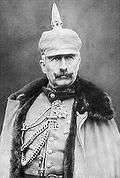


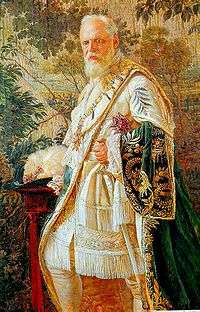
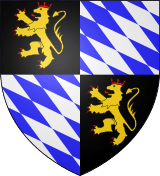
.svg.png)
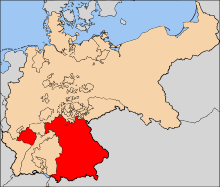


.svg.png)




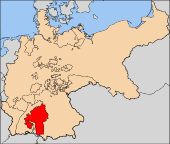


.svg.png)

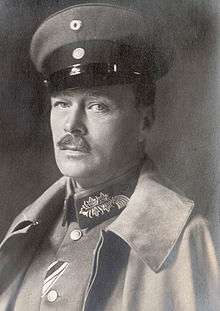
.gif)
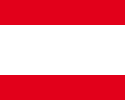
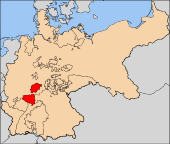
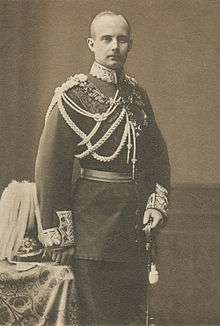
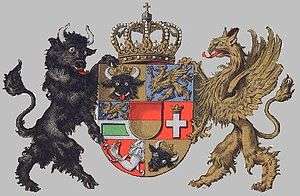

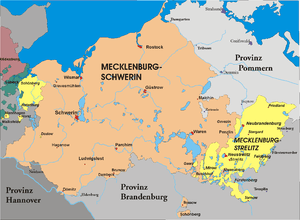
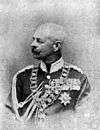

_Oldenburg.svg.png)

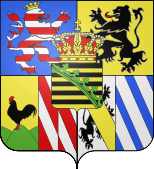
.svg.png)
_Sachsen-Weimar-Eisenach.svg.png)

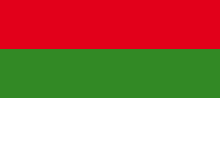
_Anhalt.svg.png)




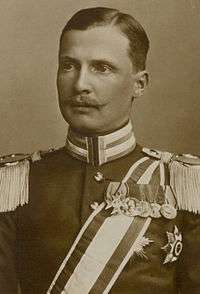

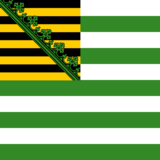
_Sachsen-Altenburg.svg.png)
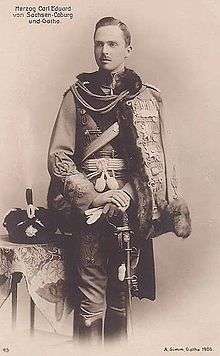

.svg.png)
_Sachsen-Coburg_und_Gotha.svg.png)
.jpg)
